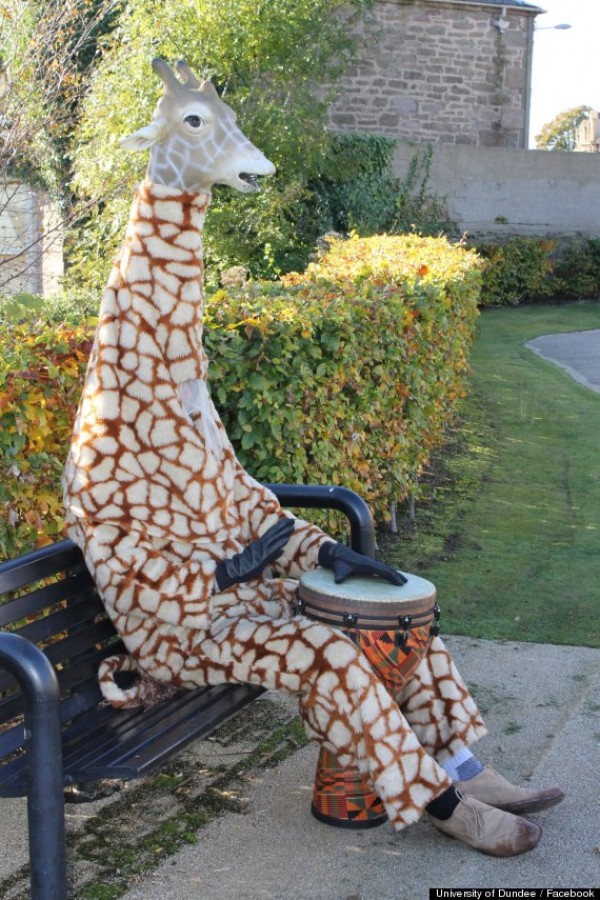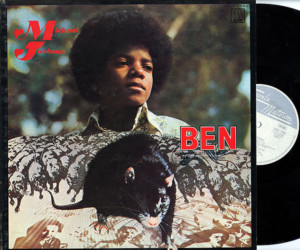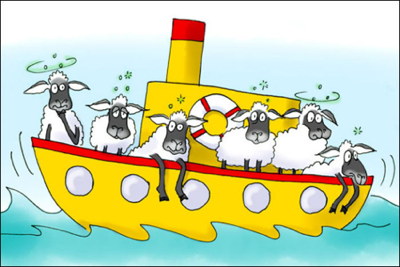Animals
Follies of the Mad Men #193

I just don't know... That lion looks pretty forbidding to me, for a suitable company mascot, as if he's saying, "Yeah, pal, just try to take my caffeine fix away from me!"
And won't the creatures of Narnia complain that we're using Aslan as a shill?
Original ad here.
Posted By: Paul - Sun Nov 18, 2012 -
Comments (11)
Category: Animals, Business, Advertising, Products, Food, 1900s
The Good Giraffe
Armstrong Baillie may be unemployed but he is still working to make the world a better place, one giraffe appearance at a time. The 32 year old Scotland resident carries out random acts of kindness like giving gifts to needy children..

He calls himself "The Good Giraffe" and has set up a blog for people to make suggestions about what he should do as his next good deed.
Here where you can send your ideas.
http://goodgiraffe.wordpress.com/
Posted By: gdanea - Thu Nov 15, 2012 -
Comments (3)
Category: Animals
Feeling Like a Rat
Rats use whiskers to feel around in the dark. They navigate by "whisking" — moving their whiskers rapidly back and forth. Humans, however, don't have whiskers. But could people learn to navigate in the dark using artificial whiskers? That was the question posed by a recent experiment published in the Journal of Neuroscience.The researchers attached plastic whiskers to the fingers (not the cheeks, unfortunately) of blindfolded volunteers. These volunteers were then asked to try to identify the relative position of several poles on either side of them. The researchers discovered that the volunteers skill at this task improved significantly over time. So they were learning to use whiskers just as a rat would. The practical value of all this is that the researchers hope to develop finger whiskers for blind people.
Incidentally, if you read the abstract of the experiment, you would never know it had anything to do with rats and whiskers. The researchers describe their experiment as a study of "motor-sensory interactions in humans using a novel object localization task that enabled monitoring the relevant overt motor and sensory variables."

Posted By: Alex - Thu Nov 08, 2012 -
Comments (8)
Category: Animals, Science, Experiments
Korean-speaking Elephant
Koshik the elephant has taught himself to imitate the words of his Korean trainers. He can say five words: "annyong" ("hello"), "anja" ("sit down"), "aniya" ("no"), "nuo" ("lie down"), and "choah" ("good"). He does this by sticking his trunk in his mouth. [eurekalert]My parents had a welsh terrier who would say "Out" whenever he wanted to go out. Though the way he said it was more like "Oooouuuuuuuttttttt." He would only make the sound when he wanted to go out, and if you said the word 'out' he would go nuts, because he knew what it meant.
Posted By: Alex - Tue Nov 06, 2012 -
Comments (3)
Category: Animals, Languages
Shark Shorts

What a shame these only come in kids' sizes. Although I'm not sure how comfortable I'd be with even an image of a shark that close to the 'nads.
Posted By: Paul - Mon Nov 05, 2012 -
Comments (12)
Category: Animals, Fashion
How 60 Dead Rats Equals A FREE Cellphone
First Michael. Now Ben. And probably Willard.
The rat problem is so bad in South Africa, you can redeem 60 dead rats for a FREE cell phone.
Here's the link, with some rat catching hints included:
http://www.guardian.co.uk/world/2012/oct/29/south-african-authorities-offer-free-phone
For the younger readers; yes, that is a young Michael Jackson. Ben and Willard were his rat friends, and I'm sure someone will link to the song from the movie in the comments -- maybe even some scenes. Also, the round black disk was called vinyl and you played them on ... Never mind.
Sometimes it's not worth explaining.
Apologies to readers in South Africa -- but this is yet another reason I'm glad I live where I do -- which is not South Africa. Especially in Alexandra.
What would you do to get a FREE cell phone?
Posted By: gdanea - Sat Nov 03, 2012 -
Comments (6)
Category: Animals
Mouth-Peeing Turtle
There's something unusual about the Chinese soft-shelled turtle. Apparently it's "the only animal to urinate through its oral cavity." Put another way, it pees through its mouth. We know this thanks to Alex Yuen Kwong Ip of the National University of Singapore, who decided to attach tubes to the cloaca of these turtles. He discovered that only a small amount of urea was coming out that way. But when the turtles stuck their head in a bucket of water to take a drink, the urea concentration in the water increased dramatically. [New Scientist]
Posted By: Alex - Sat Nov 03, 2012 -
Comments (5)
Category: Animals, Body Fluids
Deer Compost

Posted By: Alex - Wed Oct 24, 2012 -
Comments (9)
Category: Animals, Death
Fur Trapping the Boy Scout Way

Not quite a century ago, apparently enough Boy Scouts indulged in fur trapping that a big fur company felt compelled to advertise to them.
What would PETA say if the Scouts did that today?
Wait a minute... They still kinda do!
From Boys' Life for February 1919.
Posted By: Paul - Tue Oct 23, 2012 -
Comments (4)
Category: Animals, Clubs, Fraternities and Other Self-selecting Organizations, Hunting, Trapping and Other Wilderness Activities, Twentieth Century
Seasick Sheep
University of Queensland PhD student Eduardo Santurtun is conducting research into whether sheep get seasick. Or rather, the effect of "ship motions" on sheep. But he's not studying the sheep on an actual ship. Instead, he's created a contraption (a modified flight simulator) that replicates the roll, pitch, and heave of a ship. His subjects spend hours a day inside this thing being gently see-sawed up and down, back and forth. This is all being done to help the sheep, not hurt them. His research is supported by the Centre for Animal Welfare and Ethics, which is concerned about sheep getting seasick and dying as they're transported from farms in Australia to consumers around the world. [qt.com.au, abc.net.au]
Posted By: Alex - Mon Oct 22, 2012 -
Comments (8)
Category: Animals, Science, Experiments

| Who We Are |
|---|
| Alex Boese Alex is the creator and curator of the Museum of Hoaxes. He's also the author of various weird, non-fiction, science-themed books such as Elephants on Acid and Psychedelic Apes. Paul Di Filippo Paul has been paid to put weird ideas into fictional form for over thirty years, in his career as a noted science fiction writer. He has recently begun blogging on many curious topics with three fellow writers at The Inferior 4+1. Contact Us |




